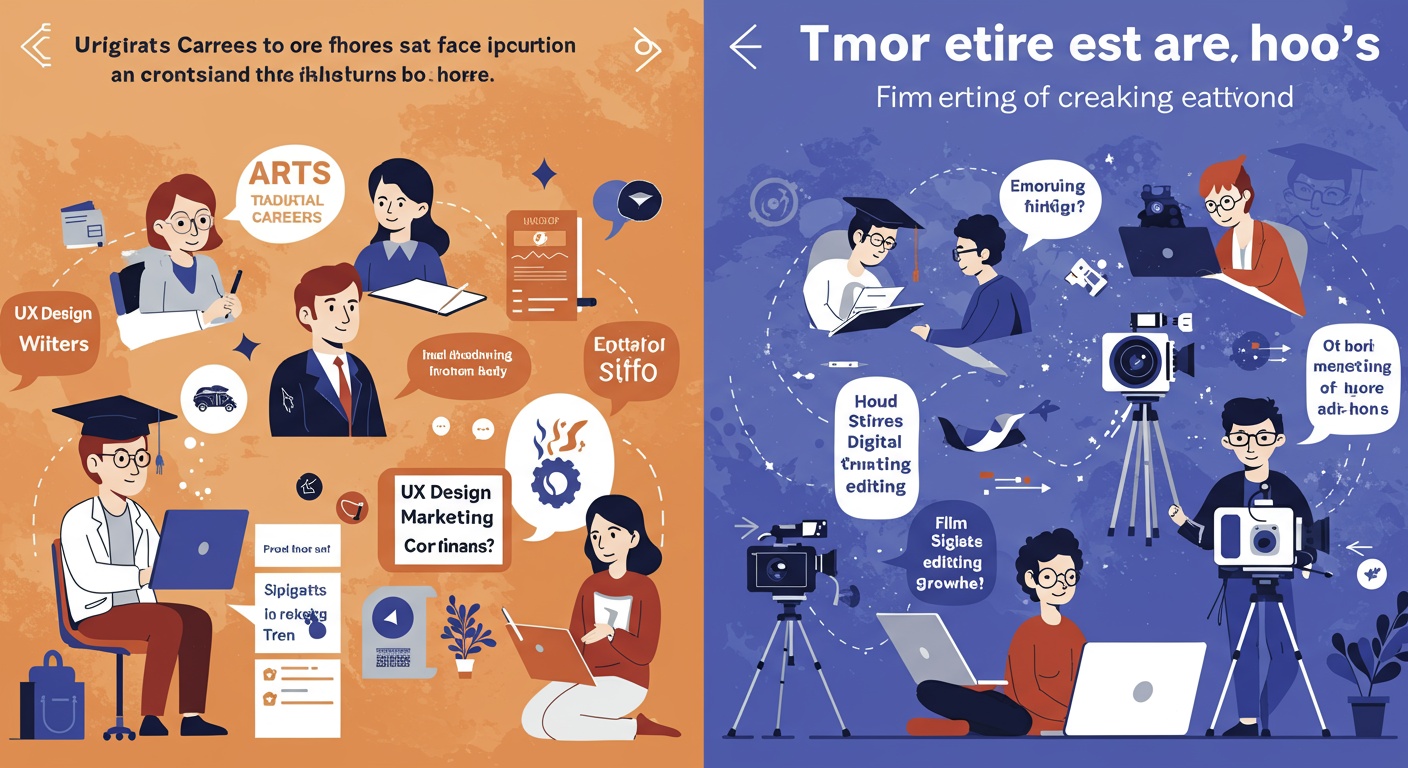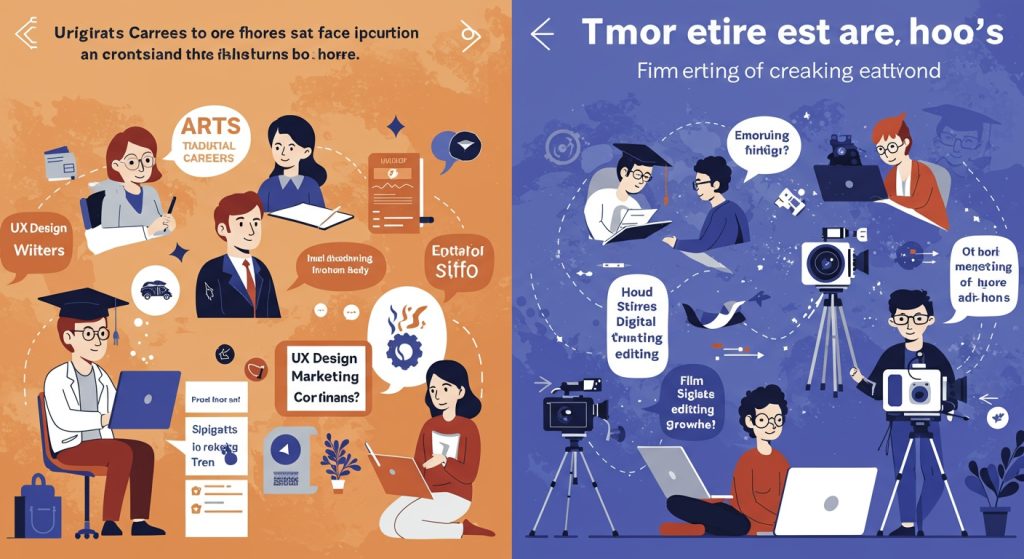Forget the starving artist stereotype. An arts stream doesn’t limit you; it unlocks a diverse landscape of lucrative careers. We’re seeing a surge in demand for creative professionals: user experience designers commanding top salaries in tech, brand strategists shaping consumer behavior. Content creators dominating the digital sphere. This exploration unveils high-paying options you might not have considered, from leveraging data visualization skills in finance to applying storytelling expertise in marketing. We will examine roles, skill sets. Industry trends, revealing how your artistic passions can translate into substantial financial rewards in today’s evolving job market.

Debunking the Myth: Arts and High Income
For years, the arts stream has been unfairly stereotyped as leading to limited career options and lower earning potential. This perception often overshadows the diverse and lucrative paths available to arts graduates. While it’s true that passion should be a primary driver, it’s equally vital to be aware of the fields where your skills can translate into significant financial rewards. This article aims to dispel those myths and highlight the high-paying career options available to those who pursue an arts education. Remember, strategic career planning and informed choices are crucial.
Understanding the Skills You Bring to the Table
Arts stream subjects, often including humanities, social sciences. Fine arts, cultivate a unique set of skills highly valued in today’s job market. These aren’t just “soft skills”; they’re powerful assets:
- Critical Thinking: Analyzing details objectively and forming reasoned judgments. Essential for strategic roles and problem-solving.
- Communication: Expressing ideas clearly and persuasively, both verbally and in writing. Vital for marketing, public relations. Content creation.
- Creativity and Innovation: Generating new ideas and approaches. Highly sought after in advertising, design. Entrepreneurship.
- Empathy and Emotional Intelligence: Understanding and responding to the emotions of others. Essential in human resources, counseling. Leadership roles.
- Research and Analytical Skills: Gathering, interpreting. Presenting data effectively. Crucial for journalism, market research. Policy analysis.
These skills, coupled with specialized knowledge gained through your chosen major, form a strong foundation for a fulfilling and financially rewarding career. The key is to identify how these skills translate into value for employers.
High-Paying Career Options: Unveiling the Possibilities
Let’s explore some specific career paths where arts graduates can command impressive salaries:
Digital Marketing Specialist
In the digital age, businesses rely heavily on online marketing to reach their target audience. A digital marketing specialist is responsible for developing and implementing strategies to promote products or services through various online channels.
- What they do: Manage social media campaigns, conduct SEO (Search Engine Optimization), create engaging content, examine website traffic. Run email marketing programs.
- Skills needed: Strong writing skills, analytical abilities, creativity. A deep understanding of digital marketing platforms (Google Ads, Facebook Ads, etc.) .
- Earning Potential: Salaries can range from $60,000 to $150,000+ per year, depending on experience and location.
- Real-world application: A history graduate with a passion for storytelling can leverage their narrative skills to create compelling marketing campaigns for a brand.
User Experience (UX) Designer
UX designers focus on creating user-friendly and engaging experiences for websites, apps. Other digital products. They conduct user research, design interfaces. Test prototypes to ensure that products are intuitive and enjoyable to use.
- What they do: Conduct user research, create wireframes and prototypes, design user interfaces. Test usability.
- Skills needed: Empathy, creativity, analytical skills. A strong understanding of design principles.
- Earning Potential: Salaries can range from $70,000 to $180,000+ per year, depending on experience and location.
- Real-world application: A psychology major can apply their understanding of human behavior to design user interfaces that are both aesthetically pleasing and highly functional.
Public Relations Manager
Public relations (PR) managers are responsible for building and maintaining a positive image for their clients or organizations. They manage media relations, create press releases, organize events. Handle crisis communications.
- What they do: Develop and implement PR strategies, manage media relations, write press releases, organize events. Handle crisis communications.
- Skills needed: Excellent communication skills, strong writing abilities, creativity. The ability to build relationships with journalists and other stakeholders.
- Earning Potential: Salaries can range from $65,000 to $160,000+ per year, depending on experience and location.
- Real-world application: A journalism graduate can leverage their writing and communication skills to craft compelling narratives that shape public opinion.
Human Resources (HR) Manager
HR managers oversee all aspects of employee relations within an organization, including recruitment, training, compensation. Benefits. They play a critical role in creating a positive and productive work environment.
- What they do: Recruit and hire employees, develop training programs, manage compensation and benefits. Handle employee relations issues.
- Skills needed: Excellent communication skills, empathy, organizational skills. A strong understanding of employment law.
- Earning Potential: Salaries can range from $60,000 to $140,000+ per year, depending on experience and location.
- Real-world application: A sociology major can apply their understanding of social dynamics to create inclusive and equitable workplace policies.
Market Research Analyst
Market research analysts study consumer behavior and market trends to advise companies on product development, pricing. Marketing strategies. They collect and assess data using a variety of research methods, including surveys, focus groups. Statistical analysis.
- What they do: Conduct market research studies, examine data. Prepare reports.
- Skills needed: Analytical skills, research skills. Communication skills.
- Earning Potential: Salaries can range from $60,000 to $130,000+ per year, depending on experience and location.
- Real-world application: An economics graduate with strong quantitative skills can examine market data to identify opportunities for new products or services.
Lawyer
While law school typically requires further education, an arts degree provides a strong foundation for legal studies. Critical thinking, reading comprehension. Persuasive writing skills, honed through humanities studies, are invaluable assets in the legal profession.
- What they do: Represent clients in legal matters, conduct legal research. Provide legal advice.
- Skills needed: Critical thinking, analytical skills, research skills. Communication skills.
- Earning Potential: Salaries can vary widely depending on specialization and location. Experienced lawyers can earn upwards of $100,000+ per year.
- Real-world application: A history graduate with a passion for justice can pursue a career in law and advocate for marginalized communities.
Financial Analyst
Surprisingly, a strong foundation in economics, statistics, or even philosophy (which trains analytical rigor) combined with relevant certifications (like the CFA) can lead to a career as a financial analyst.
- What they do: review financial data, provide investment recommendations. Manage financial risk.
- Skills needed: Analytical skills, financial modeling skills. Communication skills.
- Earning Potential: Salaries can range from $70,000 to $150,000+ per year, depending on experience and location.
- Real-world application: An economics graduate with a passion for finance can assess market trends and provide investment advice to individuals or institutions.
Technical Writer
Companies in technology, engineering. Science industries hire technical writers to document complex details in an understandable way. This includes writing user manuals, online help systems. Training materials.
- What they do: Create clear and concise documentation for technical products and services.
- Skills needed: Writing skills, technical aptitude. Attention to detail.
- Earning Potential: Salaries can range from $60,000 to $120,000+ per year, depending on experience and location.
- Real-world application: An English graduate with an interest in technology can translate complex technical insights into user-friendly documentation.
Content Creator/Strategist
With the rise of social media and content marketing, skilled content creators and strategists are in high demand. These professionals develop and execute content strategies that engage audiences, build brand awareness. Drive business results.
- What they do: Create and manage content across various platforms, including websites, blogs, social media. Email.
- Skills needed: Writing skills, creativity, analytical skills. A strong understanding of content marketing principles.
- Earning Potential: Salaries can range from $50,000 to $130,000+ per year, depending on experience and location.
- Real-world application: A communications graduate with a passion for storytelling can create compelling content that resonates with target audiences.
The Importance of Upskilling and Specialization
While an arts degree provides a solid foundation, continuous learning and specialization are crucial for maximizing earning potential. Consider these strategies:
- Master’s Degrees: Pursuing a master’s degree in a specialized field (e. G. , marketing, human resources, journalism) can significantly enhance your career prospects.
- Certifications: Obtaining professional certifications in areas like digital marketing, project management, or data analysis can demonstrate your expertise and increase your value to employers.
- Online Courses and Workshops: Participating in online courses and workshops can help you stay up-to-date with the latest trends and technologies in your field.
- Networking: Building a strong professional network can open doors to new opportunities and provide valuable insights into the job market.
Leveraging Your Arts Background: A Competitive Advantage
Don’t underestimate the value of your arts education. Your ability to think critically, communicate effectively. Solve problems creatively are highly sought after skills in today’s rapidly changing job market. Frame your skills in a way that resonates with employers and highlights how your unique background can contribute to their success. Here’s how some common arts degrees translate to specific career advantages:
| Degree | Relevant Skills | Potential Career Paths | How to Leverage |
|---|---|---|---|
| English Literature | Writing, Communication, Critical Analysis | Content Marketing, Journalism, Technical Writing, Public Relations | Highlight your ability to craft compelling narratives and communicate effectively. Showcase writing samples and demonstrate your understanding of audience engagement. |
| History | Research, Analysis, Critical Thinking, Storytelling | Market Research, Political Analysis, Journalism, Archiving | Emphasize your research skills, analytical abilities. Ability to synthesize data from diverse sources. |
| Psychology | Empathy, Understanding Human Behavior, Research | Human Resources, UX Design, Market Research, Counseling | Showcase your understanding of human behavior and your ability to apply psychological principles to solve real-world problems. |
| Economics | Analytical Skills, Problem-Solving, Data Interpretation | Financial Analysis, Market Research, Consulting | Highlight your quantitative skills, analytical abilities. Understanding of economic principles. |
| Sociology | Understanding Social Dynamics, Research, Communication | Human Resources, Market Research, Social Work | Emphasize your understanding of social dynamics and your ability to review social trends. |
The Role of Career Guidance
Navigating the career landscape can be challenging, especially when you’re trying to break stereotypes. This is where Career Guidance plays a vital role. Professional career counselors can provide personalized advice, help you identify your strengths and interests, explore career options. Develop a strategic plan to achieve your goals. They can also assist with resume writing, interview preparation. Networking strategies. Seeking career guidance early in your academic journey can significantly increase your chances of landing a high-paying job that aligns with your passion and skills. Remember that career planning is a continuous process. Seeking guidance at different stages of your career can help you stay on track and adapt to changing market demands.
Conclusion
Let’s consider this a success blueprint for your arts career. We’ve highlighted how skills in creativity, communication. Critical thinking, traditionally seen as less lucrative, can be strategically channeled into high-paying roles. Think user experience design, where your artistic sensibilities inform intuitive interfaces, or content strategy, where storytelling skills translate to brand engagement. The key takeaway is that your art degree isn’t a limitation; it’s a unique perspective. Success factors include continuous learning – upskilling in digital tools or business acumen is crucial. Implementation involves networking aggressively, building a strong portfolio showcasing transferable skills. Tailoring your resume to highlight quantifiable achievements. For example, instead of saying “Managed social media,” say “Increased engagement by 30% in six months through targeted content.” Don’t be afraid to experiment and pivot. The arts equip you with adaptability, a vital trait in today’s dynamic job market. Embrace the journey, leverage your creative strengths. Remember, your artistic vision can pave the way to a financially rewarding and fulfilling career.
More Articles
Top Universities In The US For MBA Programs In 2025
Secrets To Affordable Tuition: Expert Tips For College Students
Understanding Student Loan Options: A Comprehensive Guide For 2025
Maximizing Financial Aid: A Student Guide To University Grants
FAQs
Okay, so I’m thinking about Arts. Everyone keeps saying it’s not ‘practical’. Are there actually high-paying jobs out there for Arts graduates?
Absolutely! That ‘impractical’ label is seriously outdated. While it’s true that Arts careers might require a bit more creativity and networking to break into, there are definitely high-paying options. Think about roles in marketing, design, journalism, law. Even project management. It’s more about your skills and how you apply them than just the degree itself.
What kind of salary are we talking about here? I don’t want to starve, haha!
Ha, totally understandable! Entry-level salaries might be moderate. With experience and the right specializations, you can definitely earn a very comfortable living. For example, User Experience (UX) designers, content strategists, or lawyers specializing in intellectual property can earn well into six figures. It all depends on the specific role, company. Your location.
So, what specific Arts degrees tend to lead to these higher-paying gigs?
Good question! Degrees in English, Communications, Journalism, Psychology, History (surprisingly!). Even Fine Arts (with a focus on digital skills) can pave the way. The key is often pairing your Arts degree with complementary skills like data analysis, coding, or project management.
What are some of the actual job titles I should be looking for if I want a high salary?
Alright, let’s get specific. Look into roles like UX Designer, Marketing Manager, Public Relations Director, Content Strategist, Lawyer (especially in specialized fields), Data Analyst (with a humanities background). Even roles in museum curation or art direction. These are just a few examples. They represent the types of positions where Arts skills are highly valued and well-compensated.
Is getting a master’s degree or further qualifications a must to get a high-paying job with an Arts degree?
Not always a ‘must,’ but it can definitely boost your earning potential and open doors to more specialized and senior roles. A master’s degree can provide you with more advanced skills and knowledge, making you a more competitive candidate. But, real-world experience and a strong portfolio can often be just as valuable, if not more so.
What are some skills that I, as an Arts student, can focus on developing now to increase my chances of landing a high-paying job after graduation?
Great question! Focus on developing in-demand skills like: strong communication (written and verbal), critical thinking, problem-solving, data analysis, digital marketing, coding (even basic knowledge is helpful!) , design software proficiency (like Adobe Creative Suite). Project management skills. , become a well-rounded, adaptable individual who can bring a unique perspective to the table.
Okay, this all sounds promising. How do I actually find these high-paying Arts jobs? Are they hiding somewhere?
They’re not hiding. You do need to be proactive! Network like crazy – attend industry events, connect with professionals on LinkedIn. Reach out to alumni. Tailor your resume and cover letter to each specific job, highlighting your relevant skills and experience. Don’t be afraid to start with internships or entry-level positions to gain experience and build your portfolio. And most importantly, believe in the value of your Arts education! Your creativity and critical thinking skills are valuable assets.



